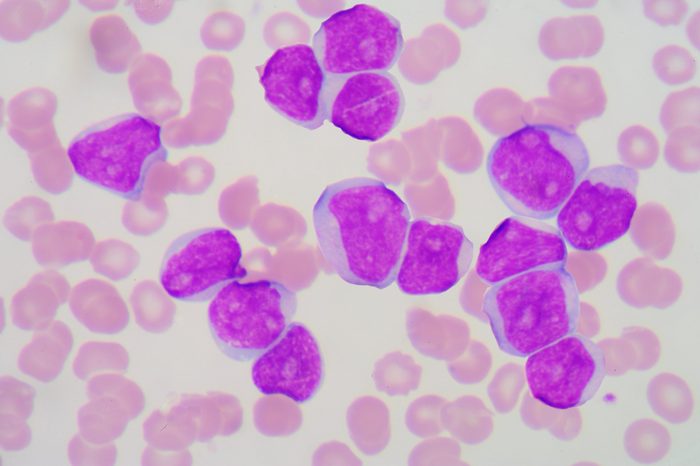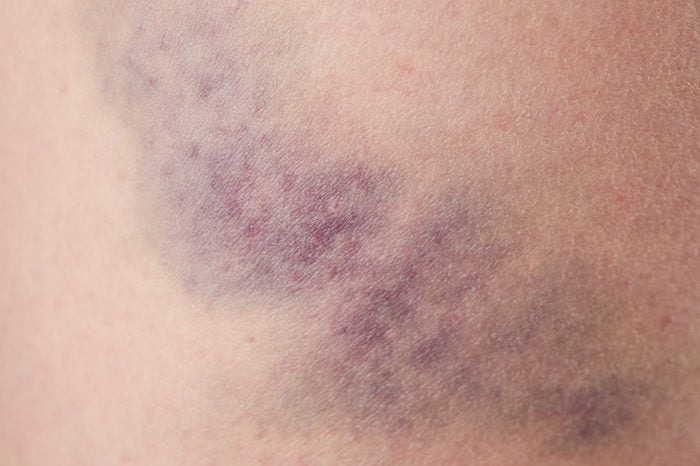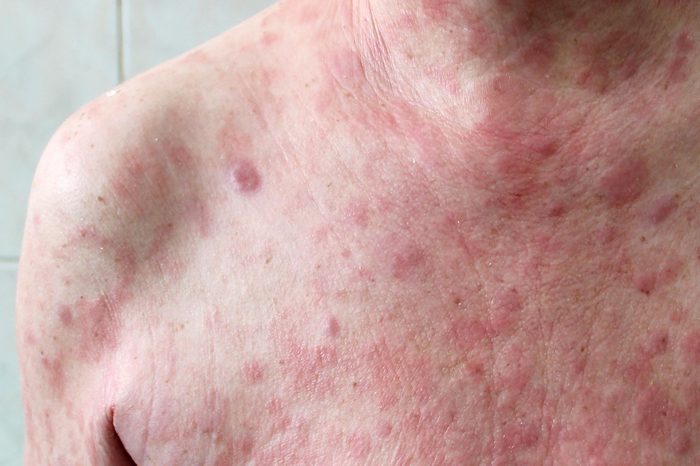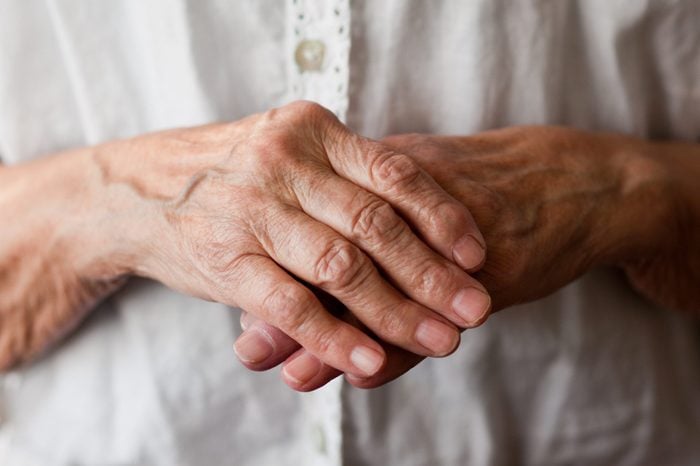
What is blood cancer?
“Blood cancer is a very broad diagnostic entity, but when you think of blood cancers, you’re typically thinking leukemia, lymphoma, and any span across many different sub-types [like multiple myeloma],” says Sean Fischer, MD, medical oncologist and hematologist at Providence Saint John’s Health Center and Adjunct Assistant Professor of Medical Oncology at John Wayne Cancer Institute in Santa Monica, California. Lymphoma occurs when cancerous cells are found in the lymphatic system. Leukemia originates in the bone marrow when the body creates an excess of abnormal white blood cells, which then interfere with the bone marrow’s production of red blood cells and platelets. In the case of multiple myeloma, cancer starts in the blood’s plasma cells, a certain type of white blood cell found in the bone marrow. Because blood cancer symptoms come on gradually, they are all too easy to ignore or overlook. These are the most common ones.

Excessive bruising
Unexplained bruising that seems to come out of nowhere (i.e. you don’t remember tripping or accidentally running into the coffee table) can be a warning sign of blood cancer like leukemia, says Jack Jacoub, MD, medical oncologist and medical director of MemorialCare Cancer Institute at Orange Coast Medical Center in Fountain Valley, California. That’s because excessive bruising typically occurs when the body has a low platelet count, a sign that could point to a blood disorder. Find out more medical reasons why you’re bruising easily.

Excessive bleeding
Unexplained bleeding that doesn’t stop easily is another symptom of leukemia. Excessive bleeding happens when your blood can’t clot properly and is one of the silent symptoms of leukemia you shouldn’t ignore.

Fatigue
While you may write-off your exhaustion to a busy schedule or stressful workload, constant fatigue that isn’t getting better warrants a visit to your doctor to rule out something more serious. “When you’re not able to produce healthy red blood cells [as those with blood cancers can’t] you can develop anemia,” explains Dr. Fischer. “This results in fatigue and low energy,” says Dr. Fischer. These medical reasons may explain why you’re tired all the time.

Fever
Because the bodies of people with leukemia aren’t able to produce healthy white blood cells, frequent infections are a very common presenting symptom, says Dr. Fischer. You may feel like you have a cold or the flu, but what will make it stand out from a standard illness is if you have a fever of 102°F or higher. “A [high] fever in an adult is not normal,” says Dr. Jacoub. Dr. Fischer adds that most cold and viruses run through our system in about three to five days, so anything well past that should be discussed with your doctor. In addition, these infections don’t tend to improve with antibiotics. Learn to spot the signs a fever is something more serious.

Specific rashes
Clinically referred to as mycosis fungoides, this lymphoma-specific rash happens when malignant cells in the blood travel to the skin showing up as a scaly, itchy appearance on the body. This isn’t to say that every rash that pops up on your skin is a cause for concern, says Dr. Jacoub, but if it’s a persistent problem that’s not getting better with topical medication over time your doctor may refer you to an oncologist for diagnosis. Check out more skin conditions that could signal a serious health problem.

Swollen lymph nodes
Painless swelling in your neck, armpits, or groin area can be a sign of blood cancer. Your lymph nodes contain white blood cells that help your body fight infection and disease but when these lymph nodes swell—and stay swollen—without any other symptoms (such as ear or throat pain), it may be a sign of blood cancer like lymphoma that originates in the lymph nodes or cancer that has spread to them.

Abdominal swelling
If you constantly feel bloated or get full quickly after only eating a small amount, this could be a warning sign that something more serious is going on. Acute lymphocytic leukemia (ALL) that is present in the liver or spleen inflate these organs, which may cause swelling in the abdomen area. This swelling can be so severe it can make it challenging for your doctor to feel these organs during an exam. Here are more stomach pains you should never ignore.

Bone or joint pain
Certain subtypes of leukemia, like acute myeloid leukemia (AML), often causes pain in the bones or joints it’s growing in. That’s because as the cancer cells take up space in the bone marrow it makes the bone marrow become overcrowded and enlarged, resulting in pain on or near the bones or joints where the infected bone marrow is.
Find out which myths about the causes of cancer doctors wish you’d stop believing.

Night sweats
There are a lot of medical reasons you may be experiencing night sweats, but if you’re waking up completely drenched in the middle of the night frequently, leukemia is one possible cause. A good rule of thumb is if you have to wake up in the middle of the night to change your clothes because they are so wet or you find yourself heavily sweating during the day, it’s time to look into it with a medical professional. Next, check out 42 more strange symptoms that could signal a serious disease.